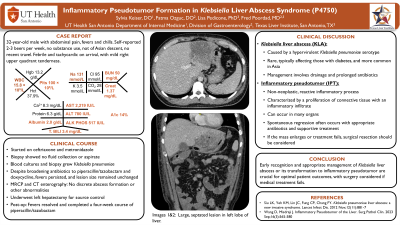Tuesday Poster Session
Category: Liver
P4750 - Inflammatory Pseudotumor Formation in Klebsiella Liver Abscess Syndrome
Tuesday, October 29, 2024
10:30 AM - 4:00 PM ET
Location: Exhibit Hall E

Has Audio

Sylvia Keiser, DO
UTHSCSA
San Antonio, TX
Presenting Author(s)
Fatma Ozguc, DO1, Sylvia Keiser, DO1, Lisa Pedicone, PhD2, Fred Poordad, MD3
1UTHSCSA, San Antonio, TX; 2Texas Liver Institute, San Antonio, TX; 3UTHSCSA, Texas Liver Institute, San Antonio, TX
Introduction: Inflammatory pseudotumor (IPT) of the liver is a rare benign lesion marked by chronic inflammatory cell infiltration and fibrous tissue proliferation1. The etiology is unclear but is often viewed as an exaggerated reaction to an infection or inflammation and can mimic malignancy. We present a case of Klebsiella Liver Abscess (KLA) syndrome in an uncontrolled diabetic patient complicated by IPT formation.
Case Description/Methods: A 32-year-old male with no medical history presented with week-long abdominal pain, fevers, and chills. He denied prior episodes and occasionally used acetaminophen for headaches. Social history included 3 beers/week and no other substance use. The patient is not of Asian descent and denied traveling outside the country. He was febrile and tachycardic on arrival, with mild right upper quadrant tenderness. Laboratory results revealed elevated AST ( >2000), ALT ( >700), alkaline phosphatase (500), total bilirubin (3.4), and hemoglobin A1c (14). CT abdomen/pelvis showed a large, septated lesion in the left liver lobe. He was started on ceftriaxone and metronidazole. He underwent a liver biopsy with no fluid collection or no fluid on aspiration. Blood cultures and biopsy grew Klebsiella pneumoniae. Despite broadening antibiotics to piperacillin/tazobactam and doxycycline, the patient had persistent fevers with no reduction in lesion size. MRCP and CT enterography showed no discrete abscess formation or other abnormalities. He underwent a left hepatectomy for source control. Postoperatively, his fevers resolved, and he completed a four-week course of piperacillin/tazobactam.
Discussion: While most community-acquired Klebsiella pneumoniae typically manifests as pneumonia or urinary tract infection, KLA syndrome is a rare condition characterized by a primary liver abscess caused by the hypervirulent serotype of Klebsiella2. It is more common in Asia and often linked to diabetes2. In this case, although biopsies grew Klebsiella pneumoniae, there was no drainable abscess and transformation to IPT is suspected. If IPT is diagnosed before resection, spontaneous regression often occurs with the correct antibiotic and supportive treatment. If the mass grows or the supportive treatment fails, surgical resection should be considered1.
[1]Wang D, Misdraji J. Inflammatory Pseudotumor of the Liver. Surg Pathol Clin. 2023 Sep;16(3):565-80
[2]Siu LK, Yeh KM, Lin JC, Fung CP, Chang FY. Klebsiella pneumoniae liver abscess: a new invasive syndrome. Lancet Infect Dis. 2012 Nov;12(11):881-7
Disclosures:
Fatma Ozguc, DO1, Sylvia Keiser, DO1, Lisa Pedicone, PhD2, Fred Poordad, MD3. P4750 - Inflammatory Pseudotumor Formation in Klebsiella Liver Abscess Syndrome, ACG 2024 Annual Scientific Meeting Abstracts. Philadelphia, PA: American College of Gastroenterology.
1UTHSCSA, San Antonio, TX; 2Texas Liver Institute, San Antonio, TX; 3UTHSCSA, Texas Liver Institute, San Antonio, TX
Introduction: Inflammatory pseudotumor (IPT) of the liver is a rare benign lesion marked by chronic inflammatory cell infiltration and fibrous tissue proliferation1. The etiology is unclear but is often viewed as an exaggerated reaction to an infection or inflammation and can mimic malignancy. We present a case of Klebsiella Liver Abscess (KLA) syndrome in an uncontrolled diabetic patient complicated by IPT formation.
Case Description/Methods: A 32-year-old male with no medical history presented with week-long abdominal pain, fevers, and chills. He denied prior episodes and occasionally used acetaminophen for headaches. Social history included 3 beers/week and no other substance use. The patient is not of Asian descent and denied traveling outside the country. He was febrile and tachycardic on arrival, with mild right upper quadrant tenderness. Laboratory results revealed elevated AST ( >2000), ALT ( >700), alkaline phosphatase (500), total bilirubin (3.4), and hemoglobin A1c (14). CT abdomen/pelvis showed a large, septated lesion in the left liver lobe. He was started on ceftriaxone and metronidazole. He underwent a liver biopsy with no fluid collection or no fluid on aspiration. Blood cultures and biopsy grew Klebsiella pneumoniae. Despite broadening antibiotics to piperacillin/tazobactam and doxycycline, the patient had persistent fevers with no reduction in lesion size. MRCP and CT enterography showed no discrete abscess formation or other abnormalities. He underwent a left hepatectomy for source control. Postoperatively, his fevers resolved, and he completed a four-week course of piperacillin/tazobactam.
Discussion: While most community-acquired Klebsiella pneumoniae typically manifests as pneumonia or urinary tract infection, KLA syndrome is a rare condition characterized by a primary liver abscess caused by the hypervirulent serotype of Klebsiella2. It is more common in Asia and often linked to diabetes2. In this case, although biopsies grew Klebsiella pneumoniae, there was no drainable abscess and transformation to IPT is suspected. If IPT is diagnosed before resection, spontaneous regression often occurs with the correct antibiotic and supportive treatment. If the mass grows or the supportive treatment fails, surgical resection should be considered1.
[1]Wang D, Misdraji J. Inflammatory Pseudotumor of the Liver. Surg Pathol Clin. 2023 Sep;16(3):565-80
[2]Siu LK, Yeh KM, Lin JC, Fung CP, Chang FY. Klebsiella pneumoniae liver abscess: a new invasive syndrome. Lancet Infect Dis. 2012 Nov;12(11):881-7
Disclosures:
Fatma Ozguc indicated no relevant financial relationships.
Sylvia Keiser indicated no relevant financial relationships.
Lisa Pedicone indicated no relevant financial relationships.
Fred Poordad indicated no relevant financial relationships.
Fatma Ozguc, DO1, Sylvia Keiser, DO1, Lisa Pedicone, PhD2, Fred Poordad, MD3. P4750 - Inflammatory Pseudotumor Formation in Klebsiella Liver Abscess Syndrome, ACG 2024 Annual Scientific Meeting Abstracts. Philadelphia, PA: American College of Gastroenterology.
